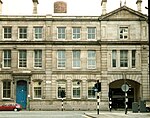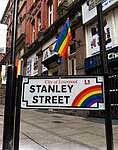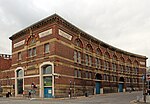The Pride Quarter, also known as the Stanley Street Quarter, Liverpool Gay Quarter or Village, is an area within Liverpool City Centre, England. It serves as the main focal point for Liverpool's lesbian, gay, bisexual and transgender community. The quarter is made up of mixed use developments including residential blocks, hotels, bars, nightclubs and various other businesses, many of which cater for the LGBT community. Aspects of the annual Liverpool Pride are also held in and around Stanley Street.
The neighbourhood encompasses Stanley Street, Davies Street, Cumberland Street, Sir Thomas Street, Dale Street, Temple Street & Lane, Victoria Street, Hackins Hey, Leather Lane and Eberle Street. Stanley Street has often been seen as the symbolic heart of the 'gay quarter' and is where a significant number of the bars are found.
On 12 August 2011, Liverpool City Council officially recognised the area as the city's 'gay quarter'.In June 2021, the district was rebranded as the 'Pride Quarter' with support from the Liverpool City Region Pride Foundation and Marketing Liverpool. The rebrand was intended to refresh and unite the UK’s first formally recognised LGBT+ area. It was also intended to cement the city's position as 'the most LGBT+ friendly in the UK' and mitigate the impact of COVID-19 restrictions on the various venues.
To officially launch the reinvention, 13 LGBT venues in the quarter will hold the ‘Pride Quarter Indoor Festival’ on Saturday 31 July 2021. A dedicated page on the Visit Liverpool website will also be launched to promote the Pride Quarter as a destination in the city. Banners revealing the quarter’s new identity will also be installed on Stanley Street with more street dressing planned to follow.










